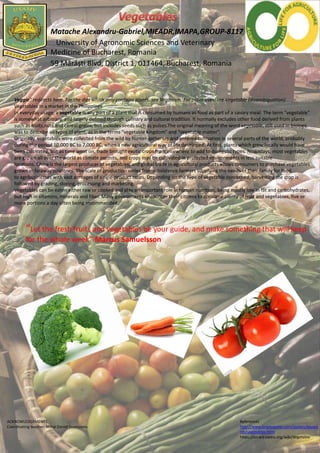New microsoft power point presentation
- 1. Matache Alexandru-Gabriel,MIEADR,IMAPA,GROUP-8117 University of Agronomic Sciences and Veterinary Medicine of Bucharest, Romania 59 M─ār─ā╚Öti Blvd, District 1, 011464, Bucharest, Romania Veggie" redirects here. For the diet which only contains plants, see Veganism. For other uses, see Vegetable (disambiguation). Vegetables in a market in the Philippines In everyday usage, a vegetable is any part of a plant that is consumed by humans as food as part of a savory meal. The term "vegetable" is somewhat arbitrary, and largely defined through culinary and cultural tradition. It normally excludes other food derived from plants such as fruits,nuts and cereal grains, but includes seeds such as pulses.The original meaning of the word vegetable, still used in biology, was to describe all types of plant, as in the terms "vegetable kingdom" and "vegetable matter". Originally, vegetables were collected from the wild by hunter-gatherers and entered cultivation in several parts of the world, probably during the period 10,000 BC to 7,000 BC, when a new agricultural way of life developed. At first, plants which grew locally would have been cultivated, but as time went on, trade brought exotic crops from elsewhere to add to domestic types. Nowadays, most vegetables are grown all over the world as climate permits, and crops may be cultivated in protected environments in less suitable locations. China is the largest producer of vegetables, and global trade in agricultural products allows consumers to purchase vegetables grown in faraway countries. The scale of production varies fromsubsistence farmers supplying the needs of their family for food, to agribusinesses with vast acreages of single-product crops. Depending on the type of vegetable concerned, harvesting the crop is followed by grading, storing, processing and marketing. Vegetables can be eaten either raw or cooked and play an important role in human nutrition, being mostly low in fat and carbohydrates, but high in vitamins, minerals and fiber. Many governments encourage their citizens to consume plenty of fruit and vegetables, five or more portions a day often being recommended. ŌĆ£Let the fresh fruits and vegetables be your guide, and make something that will keep for the whole weekŌĆØ-Marcus Samuelsson ACKNOWLEDGEMENTS Coordinating teacher: Mihai Daniel Frumu╚Öelu References http://www.brainyquote.com/quotes/keywo rds/vegetables.html https://en.wikipedia.org/wiki/Vegetable
